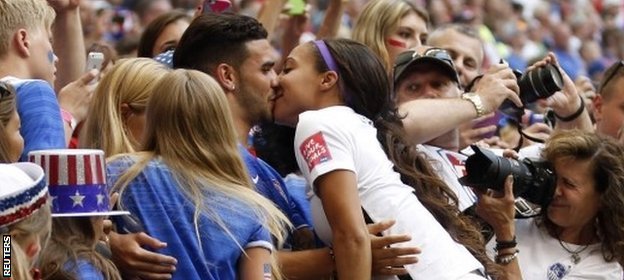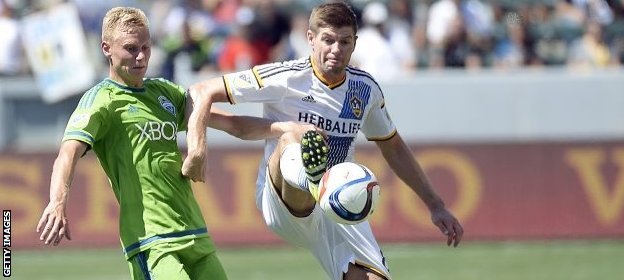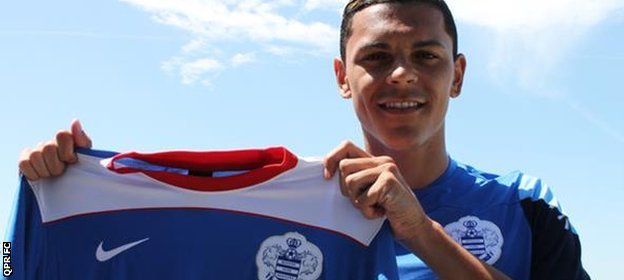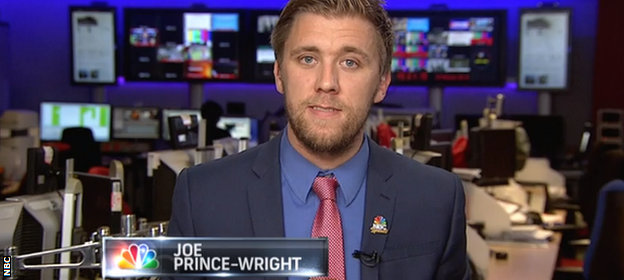
Dom Dwyer (centre) went from English non-league to the American big league
Why more British students are taking US soccer scholarships
Six years ago, Dom Dwyer's career was going nowhere.
Released by Norwich City as a schoolboy, he entered semi-professional football, turning out for King's Lynn and Staines Town, who play in the Ryman Premier Division.
It was there, in the foothills of the English game, that he looked west and decided to move to the United States.
Dwyer signed up to a firm who – for a fee – help organise soccer scholarships at US colleges for young, talented British footballers.
Getting a scholarship means the college pays some, or all, of the student's tuition fees and costs.
The firm, Soccer Icon USA, held a trial at QPR's training ground, to see whether those who had signed up were good enough for college soccer.
"I think I scored a hat-trick in the first 10 minutes," remembers Dwyer, now 25.
"The coaches took me off early and said: 'So – whereabouts in America do you want to go?'"

Dwyer kissing his wife, Sydney Leroux, at the Women's World Cup final in July
Dwyer spent two years at Tyler Junior College in Texas, before moving to the University of South Florida.
While there, he was signed by Major League Soccer club Sporting Kansas City. He has since scored more than 50 MLS goals, was named in the 2014 All Star team alongside Thierry Henry and, in 2015, is on a guaranteed salary of more than £300,000 a year.
He is also married to Sydney Leroux, who was a member of the USA's World Cup-winning women's team earlier this year.
"It's pretty amazing," says Dwyer. "I'm a little kid from England, and last year I was at the White House [after winning the 2013 MLS Cup].
"I just thought: 'What are they doing, letting me in here?'"
Jumping on the bandwagon
Dwyer is not the only British player who has gone from US college to the MLS.
Matt Watson – who studied at the University of Maryland, after being released by Wolves as a youngster – plays for Chicago Fire.
Otis Earle, son of former Wimbledon midfielder Robbie Earle, is at FC Dallas, via the University of California, Riverside.
Preston-born Luke Mulholland, who studied in North Carolina, is at Real Salt Lake, while Andy Rose, once a Bristol City youth, went from the University of California in Los Angeles to Seattle Sounders.
Few Britons will emulate their careers. But more and more are trying.

Andy Rose studied at UCLA before joining MLS side the Seattle Sounders
According to the Fulbright Commission, almost 11,000 British students were at American colleges in the past academic year – an increase of 21% in the past 10 years.
Although the number of soccer scholarships is not recorded (there's no American equivalent of Ucas, the organisation through which applications are processed in England and Wales) it is clear they are becoming more popular.
Chris Cousins, who runs Sports Recruiting USA, went to Illinois on a soccer scholarship in 2003.
"I was probably one of a dozen going to America, if that," he says.
Now, he estimates that more than 600 British students – male and female – will cross the Atlantic to start soccer scholarships this year.
Cousins thinks rising tuition fees in England is one factor, having increased from £1,100 in 2003 to a maximum of £9,000 a year now. He also thinks social media has played a part.
"When you see your mate on Twitter or Facebook playing in California or Florida, it makes it more tempting," said Cousins.
Studying Stateside
|
|---|
|
There are around 4,000 colleges and universities in the US |
|
Almost 11,000 Britons study there – a rise of 21% in the past 10 years |
|
An estimated 600 British students get soccer scholarships each year |
College soccer is certainly attractive: in 2013, more than 30 teams had average attendances of more than 1,000, 10 with more than a 2,000 average, with some derbies attracting over 10,000 fans. To put that in perspective, last season English League Two sides Morecambe and Accrington both averaged less than 2,000.
The biggest games are shown on national television, and there is a clear route to turning pro: every year, MLS clubs take their pick of the best college players via the superdraft.
But there is another reason why more Britons are heading to American colleges – the rise in companies, or middlemen, who arrange soccer scholarships.
Pass4Soccer, which began in 2003, was one of the first. According to their latest annual report, they now have 40 competitors.
"It seems in the past 12 years they've sprung up left, right, and centre," said Daniel Gray, a director at the company.
"Five years ago, there were 10 or 15. Now there are 40. People are jumping on the bandwagon."
Each firm is different but, broadly, the model is the same. Students pay a fee, and the company gets them a place at a US college – if they are good enough on the pitch and are capable of getting a degree.
The companies' fees vary. Sports Recruiting USA, one of the cheapest, charges £999; Pass4Soccer is £1,295; others charge more than £2,000.

Luke Mulholland (white shirt) entered the MLS in 2014, after playing in the American lower leagues
The firms claim it is money well spent – they say, with contacts and experience, they are able to get better scholarships for their students.
Pass4Soccer, for example, estimate that 15% of their students get full scholarships – meaning the college pays all of the student's fees and living costs.
Sports Recruiting USA say their students, on average, get 90% scholarships – leaving students to pay just 10%.
When a year at a US college costs the average international student more than £20,000 , paying £1,000 or £2,000 to a firm could be a wise investment.
But, as one QPR player knows, not everyone needs a middleman.
‘I got my money back and did it myself’
When Tyler Blackwood was 18, he had – in his own words – "given up".
As a schoolboy, Tottenham Hotspur said he was too short. Watford said the same, as did Northampton Town.
After a growth spurt, Blackwood, who is now over 6ft, was invited to a trial game at lower-league Barnet.
But, on the day of the game, the manager Paul Fairclough resigned and his trial never happened. Instead, he began working in his dad's bar in Oakwood, north London.
"It was a horrible year," remembers Blackwood. "I had friends in the pro game, and I was watching them make their debuts.
"Football had always been my plan, then suddenly I realised – it's not going to happen."
When his dad encouraged him to kickstart his career at an American college, they paid for a firm to arrange a scholarship.
"But the offers were from bad schools in terrible states," says Blackwood. "In the end, I got my money back and did it myself."

Tyler Blackwood made his QPR debut in August
In 2011, the family went on holiday to Florida, so Blackwood emailed the soccer coach at the University of Tampa, asking for a trial.
The college accepted him, but offered only a 25% scholarship.
"My dad borrowed money, took out loans, to make sure he could pay the rest," says Blackwood, now 24.
"I told him he'd only have to pay for the first year, and then I'd get a full scholarship. And I did."
This summer, Blackwood returned to England for a trial at QPR. It was successful, and he made his debut in August, away to Yeovil in the League Cup.
He is completing his four-year degree in London, taking his laptop on the team bus to catch up with work.
"I recently had an exam that started at 8pm, Florida time," says Blackwood.
"That was 1am in the UK. I'm looking forward to graduating, put it that way."
‘They’re sarcastic, you know?’
As Blackwood shows, the quality of British players heading to America, as well as the quantity, is increasing.
Cousins says that, 10 years ago, it was "county players getting the best scholarships – now it's people getting released from Chelsea and Manchester City".
But what do British players offer that Americans – or other nationalities – do not?
"Work ethic sets them apart," says Steve Clements, who coached Dom Dwyer at Tyler Junior College in Texas.
"I must have had 100 British players, and they've always been hard-working. For example, nobody outworked Dom.
"Fantastic player, fantastic person, and a good friend. At Christmas, I came into my office and there he was, on a surprise visit.
"He didn't even tell me he was coming. He's that sort of guy."
And, says Clements, the British bring something else to the team, as well as hard work.
"The Brits have fantastic humour. They're sarcastic, you know? And they can play."
There’s more to it than football

Joe Prince-Wright won a full scholarship in Pittsburgh – and earned two degrees
For those who do not make it professionally, the college degree is a decent consolation.
Graduates from soccer scholarships move into a range of careers: one of Clements's former British students works for Bank of America, another supplies souvenirs to major league sports ("If you need a number one finger, I know who to call," he says).
Joe Prince-Wright went on a soccer scholarship to the University of Pittsburgh and came back with two degrees: one in communication, and one in English writing.
Those qualifications helped him become a website editor for the American network, NBC, in London.
"Academically, college was an eye-opener," he says.
"You only focus on your main subject in the last two years, so I was doing algebra classes, astronomy classes, everything.
"We'd have classes, train for three hours a day, then have more classes. On a Friday you might fly three hours to Tampa, and have a game there.
"On a Saturday, you'd fly four hours to Chicago, train, play on the Sunday, fly back, then start another week of classes.
"It was like being a full-time student and a professional soccer player."
One man who values a college education is Dwyer, who turned professional before finishing his degree in communications and psychology.
However, despite his fame and fortune, he plans to complete his course, graduate, and finish the adventure he started six years ago.
